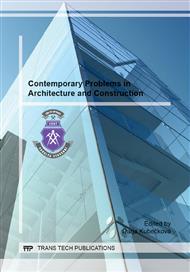p.807
p.811
p.817
p.823
p.827
p.834
p.839
p.844
p.849
Urban Spatial Justice in Australian Low-Carbon City: Perth as a Case Study
Abstract:
As one of the prominent cities across the world holding the idea of urban spatial justice, Perth, the capital city of Western Australian, promotes the concept of “harmony between urbanization and nature”. Perth is applied as the case study on the basis of Edward Soja’s theory of “Spatial Justice” and Page’s theory of “Intra-generational Equality” via empirical approach to inquire into the coordinated and balanced development of three elements in urbanization of Perth: economy, society and environment. It articulates the temperance to the existing environment and natural resources as the core value when promoting “Intra-generational Equality” and refers to the equal allocation and rational consumption of the existing environment and natural resources as the spatial equality in Perth. In addition, another focus goes to the analysis of the relation between the scientific urban management systems and the low-carbon spatial justice, and it is “Intra-generational Equality” that proves to be the basic premise and foundation on which the relation counts, which serves as a reference to the international metropolis’ urban spatial justice across the world.
Info:
Periodical:
Pages:
827-833
Citation:
Online since:
October 2014
Authors:
Keywords:
Price:
Сopyright:
© 2014 Trans Tech Publications Ltd. All Rights Reserved
Share:
Citation:


